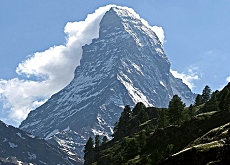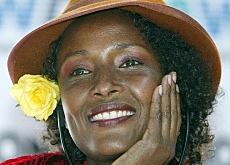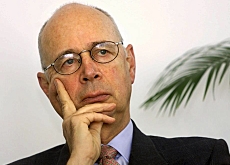Young Global Leaders focus on the future

Young global leaders nominated by the World Economic Forum have put their heads together in the alpine resort of Zermatt looking to build a better future.
Our correspondent went along to the inaugural summit to hear their visions on the probable state of the world in 2020 and on what needs to be done to make the world a better place.
Opening the summit, WEF founder and executive chairman, Klaus Schwab, made sure the young leaders present were in no doubt as to what they were expected to do.
“There is so little vision in the world today,” said Schwab in his introductory speech.
“Governments, corporations and non-government organisations (NGOs) won’t be able to solve the world’s problems on their own – only through collaboration will problems be solved.”
As a journalist covering the event, I was heartened to hear that I too had a role to play, albeit not as a young global leader.
In acknowledging criticism of the WEF’s legitimacy – a common theme in the press – Schwab stressed the importance of transparency and the role of the media in educating the public.
The key thing, he said, was results, and here the WEF played an important role. “Not necessarily concrete actions, but the ability to change the mindset of the world.”
Schwab admitted this would not be easy and would involve some tough decisions. “But if we want to make progress, we have to really look at all the challenges in the world and obviously undertake some risks and make some sacrifices,” he told swissinfo.
Good intentions
It is difficult not to be slightly sceptical when in the first “visioning” exercise you are told to “look for knowledge and feed your imagination” and to create a “highly integrated value chain and paradigm shift”.
However, anyone would feel small standing next to the collective value and potential – not just financial but also cultural and intellectual – of the 120 leaders who attended.
And especially next to Dikembe Mutombo, a 2 metres 18 centimetres-tall National Basketball Association (NBA) player from the Democratic Republic of Congo who set up his own foundation in 1997 to improve public healthcare in his native country.
At the welcome reception the desire to get networking was palpable. The first task was the “intention wall” – find the leader with whom you had been paired and together write a common vision for a better world.
These ranged from the economically advanced to the poignantly simplistic: “I want to replace funerals for the young with funerals for the old.”
The next morning saw the first “knowledge marketplace” plenary workshop. Young Global Leaders discussed with experts the key challenges for 2020 in five areas: development and poverty, environment, education, health, global governance and security.
Virtual interaction
In addition to brainstorming and networking, community-building outdoor activities were on the agenda.
This complemented Schwab’s vision that Young Global Leaders would not just meet and go away, but bond and interact on a continual basis. “A real encounter followed by virtual interaction,” he said.
To this end, one group had exchanged their BlackBerrys for crampons and were meeting at 5.30am on Sunday morning to climb the Matterhorn. (In reality a cable car ride up a mountain and then a two-hour walk holding on to a rope.)
The Matterhorn played a literal and figurative role. “We have a big mountain to climb – and climbing it is made more difficult by a lot of cloud,” said Ged Davis, managing director at the centre of strategic insight at the WEF, referring to the various challenges facing the world.
But Davis’s ultimately positive premise was that all problems come back to people and that “you can create the future”.
The Self-declared Pessimist Award on the other hand went to Georges Muller, the Swiss chairman of SGS, who said that economies in Europe are at best stable, democracies in Europe can’t cope and “one way or another the standard of living will decrease”.
Recurring themes
No one would expect three days of talking to produce concrete results, but recurring themes emerged: the challenge for society and governments to keep up with rapid advances in science and technology; more people living longer will cause healthcare and insurance problems; China and India will be the big growth areas.
Everyone agreed that simple communication in the future is essential. As one expert said, it’s critical for the media to move away from Michael Jackson and focus on issues in developing countries.
The ideas of the summit will be fed into the 2006 WEF summit in Davos. How successful this will be is impossible to say, but as the director of a British company told swissinfo: “You’ve got to try, haven’t you?”
swissinfo, Thomas Stephens in Zermatt
This was the inaugural summit of the Forum of Young Global Leaders, which is based in Geneva. It was attended by 120 of the 238 people nominated.
It is incorporated in the WEF as an independent, not-for-profit foundation under the supervision of the Swiss government.
Each year around 250 Young Global Leaders are nominated to serve for five years.
The aim is for a community of 1,111 leaders by 2009.
Swiss businessman Klaus Schwab founded the World Economic Forum in 1971.

In compliance with the JTI standards
More: SWI swissinfo.ch certified by the Journalism Trust Initiative



You can find an overview of ongoing debates with our journalists here . Please join us!
If you want to start a conversation about a topic raised in this article or want to report factual errors, email us at english@swissinfo.ch.